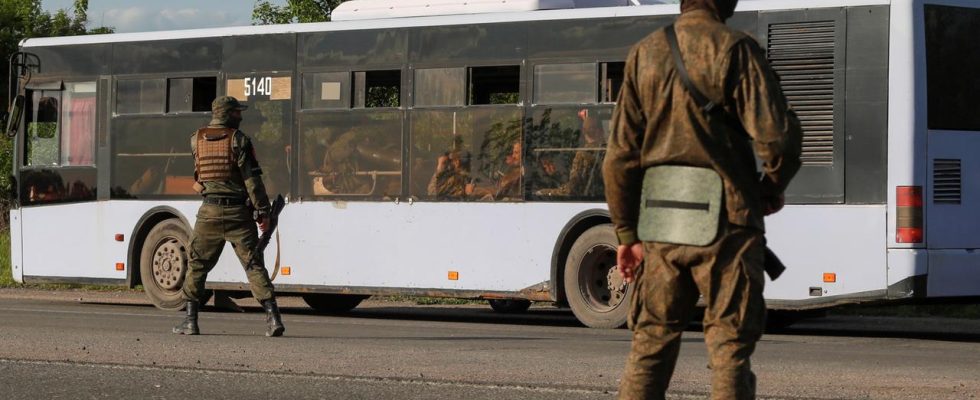A year ago, the last Ukrainian defenders of the Azovstal plant surrendered to the Russian attackers – many are still in captivity today. A never-ending ordeal for the relatives.
On May 20, 2022, the battle for the Azovstal plant in Mariupol ended. The last Ukrainian soldiers laid down their arms and surrendered. Many prisoners of war – including the commanders – could now be exchanged. They report inhuman conditions, torture and hardly any food. Many soldiers come out of captivity severely emaciated. How is their reintegration going? And how are those who are still waiting for loved ones?
Every day could be our last day. This could be the last conversation for me. But who cares?
Illia Samoilenko said about a year ago in the daily topics. The soldier from the controversial Azov regiment was connected live at the time – from the controversial Azovstal plant in Mariupol. The Ukrainian troops had been holed up in the underground bunkers for weeks. Then your situation seems hopeless.
“We cannot surrender to the Russians, because that would mean immediate death for us. They would sentence us immediately, or we would go to prison for life, or they would execute us, as has happened to other soldiers,” Samoilenko said at the time .
inhumans conditions of detention
Just a week after this interview, the soldiers laid down their arms – on orders from the Ukrainian government, it is said. Since then, hundreds of men and women have been freed from captivity. The feared show trials or executions of the Azov commanders did not materialize.
However, relatives like Anna Naumenko report inhuman prison conditions and accuse Russia of violating the Geneva Convention: “The physical condition of the boys speaks for itself. At the last exchange there was a man who lost more than forty kilos, Dimitrij lost seventeen kilos “Naumenko says.
Beat until the bones break
Naumenko’s husband Dmitrij was only recently freed from captivity. But the vast majority of those with whom Dmitry fought at the Azovstal plant are still awaiting release. Dmitry told his wife about systematic torture, about beatings until the bones broke, about darkness and hunger in Russian captivity.
But that wasn’t the worst thing for him, says his wife: “When the bunkers collapsed at the end of the fighting for the Azovstal plant and there were many dead and injured – that was more difficult for him.” That left more marks than the torture, says Naumenko. Even daily beatings were not as hard for her husband to endure mentally as what happened in the Azovstal plant.
Relatives are fighting for releases
Nevertheless, Anna Naumenko is surprised. When Dmitry came home, he was surprisingly well despite everything, she reports. Together with other relatives, Naumenko is now fighting for the release of the other prisoners. They try to put old or badly injured soldiers on the exchange lists of the Ukrainian military intelligence service.
But nobody can give them a guarantee, says Tamara Prozenko. Her boyfriend Oleksandr is also a prisoner of war. “It’s Russian roulette who gets swapped and who doesn’t. Really every swap is terrible,” she laments. Her boyfriend has already sat on the bus home twice – then he would simply have been taken back to captivity. “A few minutes or hours before the exchange, he was simply taken off the bus with no explanation,” Protsenko said.
“The Longer, The Worse”
Oleksandr experienced his 20th birthday in captivity. He was last seen by fellow prisoners in a camp in Russia – in poor health, reports Protsenko. Sometimes the 21-year-old blames herself for not doing enough for his release.
“It’s difficult, especially when you see the condition in which the boys arrive. You understand: the longer, the worse. Especially when they keep being transferred,” Prozenko describes the situation. In each new detention center, the men would be tortured and interrogated anew.
The last major prisoner exchange took place in April. But Oleksandr was again not among the 130 Ukrainians who returned home that day. A big burden for his girlfriend Tamara – for weeks she hardly gets out of bed. She has to keep waiting, she says. And prepare for the worst.

